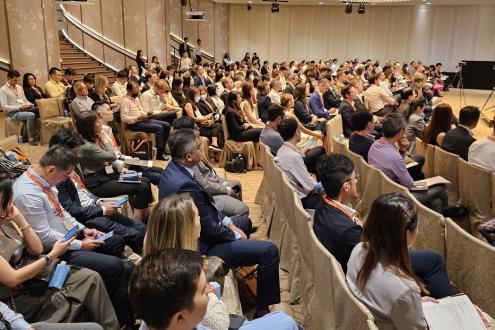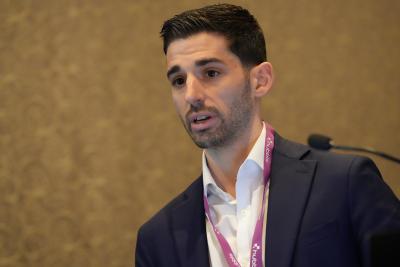The Challenges Around Training and Professional Development in Wealth Management in Asia

Mark Wightman of EY
Jun 13, 2023
Independent wealth management firms in Asia are finding that talent across all key areas of their businesses is in short supply, and costs are rising inexorably. Luckily, the growth of the local private wealth market and the influx of more global HNW and UHNW wealth to the region are combining to make the revenue potential plenty worthwhile to sustain these types of investments and commitments. So, how can the EAMs and MFOs find, enhance and retain their talent, from the technology and compliance experts to the client-facing RMs and advisors? How can firms enhance their training and professional development, and in which key areas do they prioritise their focus? A panel of experts gathered at the Hubbis Independent Wealth Forum in Singapore on May 10 to offer their perspectives on these and other key matters, zooming in on the increasingly vital areas of professional development and training. We have summarised their views in the extended bullet points below.
These are some of the questions the experts tackled:
- How is the training and professional development framework in Singapore evolving?
- How can we improve training and make is more relevant and impactful?
- How can we use training to attract and retain the right talent? And differentiate the firm and create a better client experience?
- Should there be a professional framework / requirement for independent wealth managers like MFOs and EAMs?
- What are the key topics and areas of focus for 2023 and beyond?
- How can training be most effective for onboarding, transition and career development?
- Making it stick – from learning to implementation. Strategies for success.
- How does HR and Compliance fit into this equation?
- How do you decide whether training has been a successful outcome - for the organisation, the RM and the client?
- Do we need to focus more on education for clients?
Chair
Mark Wightman
Asia-Pacific Wealth & Asset Management Consulting Leader
EY
Panel Members
Arjan de Boer
Head of Markets, Investments & Structuring, Asia
Indosuez Wealth Management
David MacDonald
Head of Business Development - Singapore
Sovereign Group
Chiara Bartoletti
Chief Operating Officer
Eightstone
Michael Stanhope
CEO
Hubbis and Wealtra
Bassam Salem
Senior Advisor
McKinsey
Why are the EAMs and MFOs not demanding the same standards of CPD (continuing professional development) as the private banks? Or are they?
CPD is not compulsory for independent firms, but it is at the banks. Some in the industry fear that CPD has become little more than a box-ticking exercise at the banks. The only three compulsory areas for learning are AML, cybersecurity, technology, and VCP. The Association of Independent Wealth Managers (AIWM) meanwhile works assiduously to enhance and encourage professional development and education.
Critics argue that the CPD system is not only a box-ticking exercise for so many, but it is too rigid and not necessarily relevant to many situations and smaller firms that need agility to identify the gaps in the markets, and in their teams and then move rapidly to address those. The carrot rather than the stick and incentivisation rather than penalising are preferable.
There needs to be greater effort and collective drive to enhance the appeals of wealth management to younger graduates who might otherwise be attracted to technology or other rapid growth or ‘trendy’ businesses
A panellist observed that actually, wealth management is far more diverse in terms of products and assets and also in terms of jurisdictions and clients than ever before. There are more and more bridges and connectivity between key centres within Asia and then between Asia and the Middle East, then with Europe and the US.
He said the wealth management associations have to do a better job in setting up the industry to appeal to a younger generation of professionals who have alternatives, who may or may not see in the 21st century that the financial industry is where they would like to be. To grow requires more people with more talent. And the model of poaching talent from other competitors simply is a zero-sum game ultimately.
A banker agreed, noting that he is seeing more younger people coming into the industry in Asia, attracted by the variety of positions and challenges and also by the pay. However, in markets like the US, the technology sector and start-ups appeal to so many who see a path to wealth through share options and equity. He recognised that for those that are successful the regards in young business are potentially immense.
In Singapore, the regulator is very proactive and there are plenty of grants potentially to help encourage continuing development
An expert reported that in Singapore, there are many grants available from the regulator and other bodies to help with professional development, making it relatively easy for smaller firms to really improve their people skills without spending a fortune. And much of the training can and should be more tailored to the specifics of the EAMs’ business and needs, not entirely standard or generic.
Another expert noted that there are also areas that can be covered purely to help team members boost their skills in areas such as Excel files, AI, languages and communication and soft skills that will help those employees in all areas of their working life, whether in wealth management now or other areas later, all of which is positive for staff hiring and retention. And for wealth market training, external education platforms and their material can also be white labelled and turned to be more branded and also more specific to the firms themselves.
The way people learn on the job is evolving and more effort should be made around personal as well as professional development
An expert pointed out that the nature of training on the job is changing. For example, he said specialist global consulting firms are now refining their proposition to offer, for example, team members a free Master's in Analytics, a Master's in Sustainability and a technology MBA, tying up with major US and other universities, allowing people to invest their own time to further their education. As employers, they must provide staff with a lot more opportunities, he said. And training is generally becoming more pathway-specific, allowing people to enhance their skills and capabilities along the lines of what their industry will needs and also relating to what their own preferences might be.
Soft skills are just as important for client-facing bankers as technical and financial skills
Eminent doctors might be able to get away with poor bedside manners, but for RMs and advisors in what is a highly competitive wealth management market, soft skills are essential to ensure that proficiency translates to engagement and client-centricity. The very human skills of EQ and professional capabilities must work in tandem, but right now in the industry, there is a huge gap to fill, as 5% or far less of the training centres on soft skills and EQ, to help with client acquisition and engagement, networking, client retention and so forth.
The wealth industry needs to also expand training beyond traditional areas and into new spheres of activity
While the regulator and the banks are mostly focusing on regulatory matters such as AML, KYC, due diligence, technology and cybersecurity, the wealth industry must expand further to concentrate more on ESG, structured products, alternative assets and markets, digital assets, the blockchain and other disruptive technologies.
To view the On Demand version of this panel, please visit this link: https://www.hubbis.com/video/reinventing-training-and-professional-development-in-wealth-management

Asia-Pacific Wealth & Asset Management Consulting Leader at EY
More from Mark Wightman, EY
Wealth Solutions & Wealth Planning
Delivering Effective, Relevant and Accessible Communication in Wealth Management
Latest Articles






